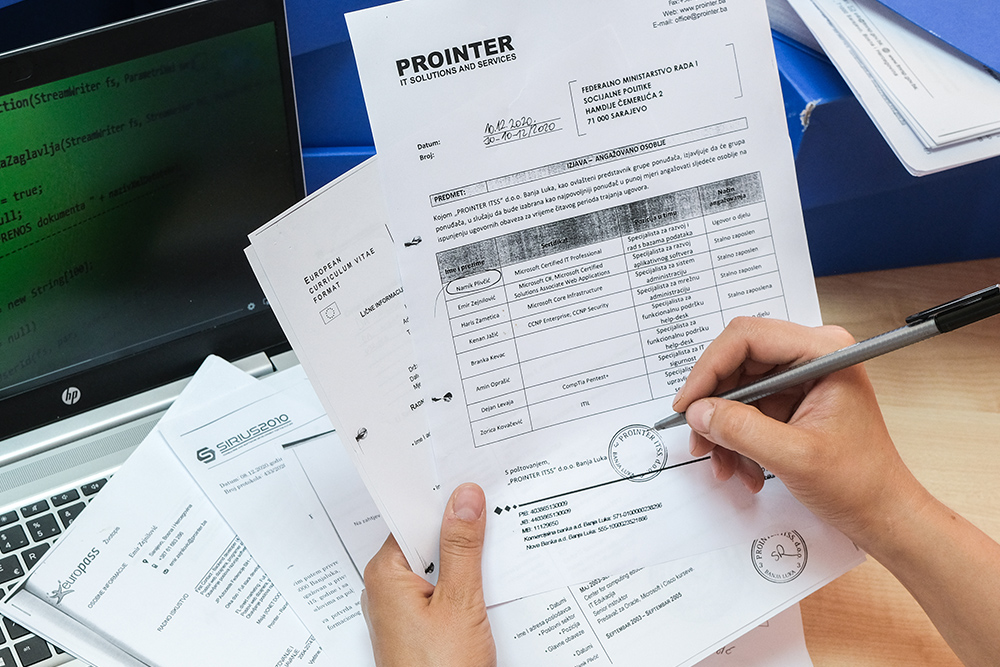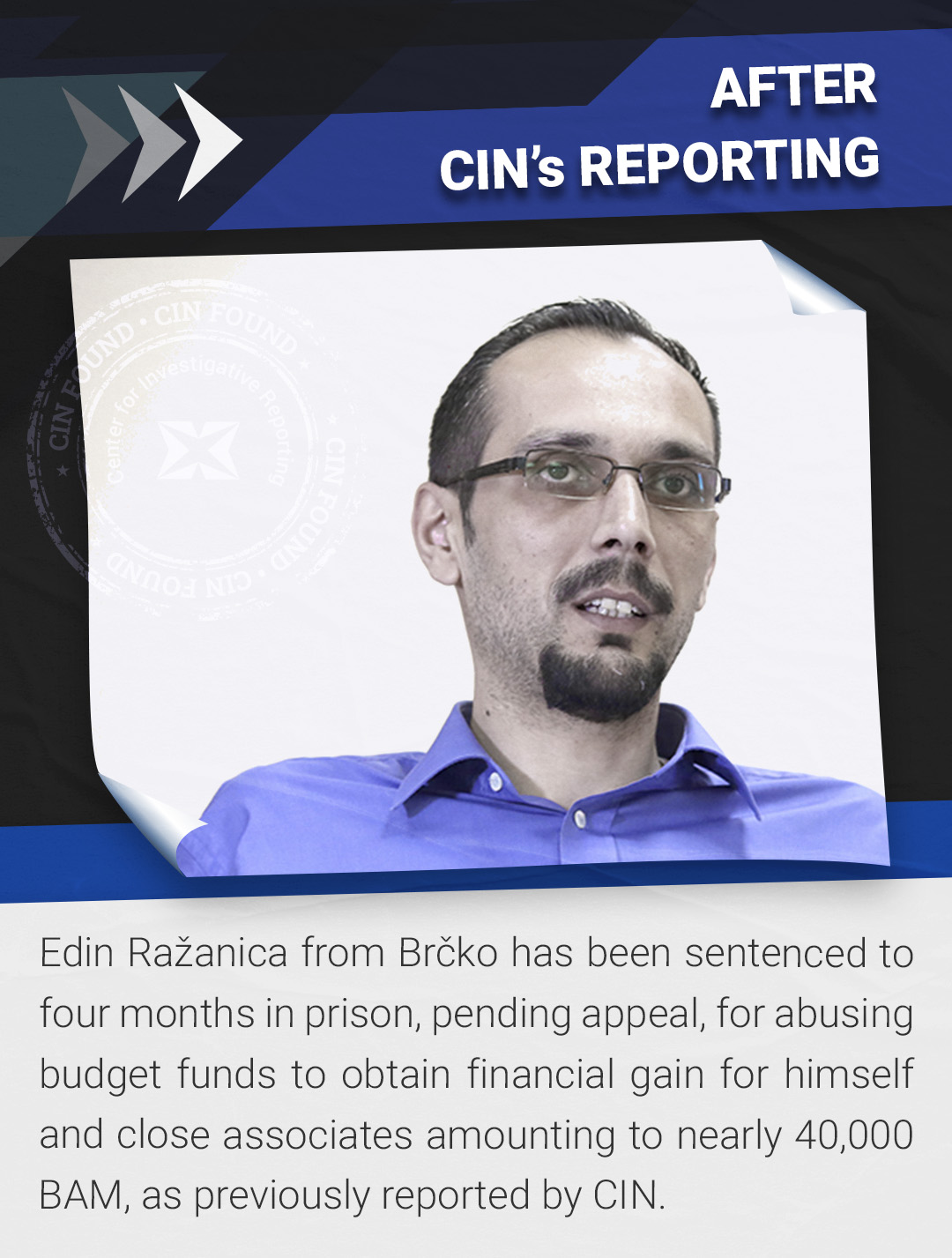- Business partners posing as associates of the US Embassy in Bosnia and Herzegovina.
- In three months, their clients gave them about the US $140,000.
- Instead of US visas, they received falsified US Embassy decisions.
The “American dream” is widely dreamed of in Bosnia and Herzegovina, but the road to it has become a nightmare for some.
“There are illegal ways, but please don’t do that, you’ll get yourself deported,” was the message lawyer Ajša Ramić sent to her clients via social networks, advertising her new business. Recently connected with immigration consultant Merjem Mirsada Veladžić, she offered help and promised success in obtaining an American immigrant visa for Bosnians and Herzegovinians eager for a better life.
The business partners, who got to know each ether through Facebook only a few days earlier, claimed they cooperate with the US Embassy in BiH and apply on behalf of the citizens for an accelerated visa process. In return, they asked clients to pay around five thousand US dollars to arrange an interview appointment at the Embassy.
“Come for an interview and welcome to America”, Veladžić emotionally pointed out in the promotional video as if it were the simplest thing in the world.
Grateful for the opportunity and hoping for a new beginning, 36 families signed cooperation contracts with intermediary agents, convinced that the Embassy stands behind them.
However, CIN discovered that Veladžić and Ramić neither cooperated nor communicated with Embassy officials, and they gave clients falsified documents.
Members of 14 families with whom the journalists spoke say that cooperation with these women brought them disappointment and shame.
“We were stood up, swindled!” says Džemal Filan, who is unsuccessfully trying to get back the money he paid to bring his cousin to the promised land.
False agency
Merjem Mirsada Veladžić, a Žepče native, moved to Jacksonville, Florida in 2017.
In addition to working in a factory, in 2018 she founded an administration and interpretation service to help elderly fellow citizens who struggled navigating the American administrative system. She claims it was not a high-dollar job and her tariff in the rigid financial system of America was “as much as one can afford”.
However, in early April this year, she needed help in Bosnia and Herzegovina. Through social networks, she found a young lawyer from Visoko, educated and self-confident Ajša Ramić, who in three days “arranged” a residence permit in Bosnia and Herzegovina for her fiance, who at the time was not even in the country.
The permit was falsified, and the email Asmir Kedić, the head of the Sarajevo field center of the Service for Foreigners of BiH, sent Ramić closing with the words “Well done on the activities, you are the best as always” – was a fake. At the time the e-mail was allegedly sent, Kedić was no longer working in the Service.
Veladžić claims she did not know all that. She was impressed by Ramić’s efficient work and the idea for cooperation was born: “Ajša, you could help because people ask me how can they bring here people from there.”
This prompted Veladžić to start the company “Bamer administration and interpreter services” in Jacksonville in mid-April and start a business with Ramić.
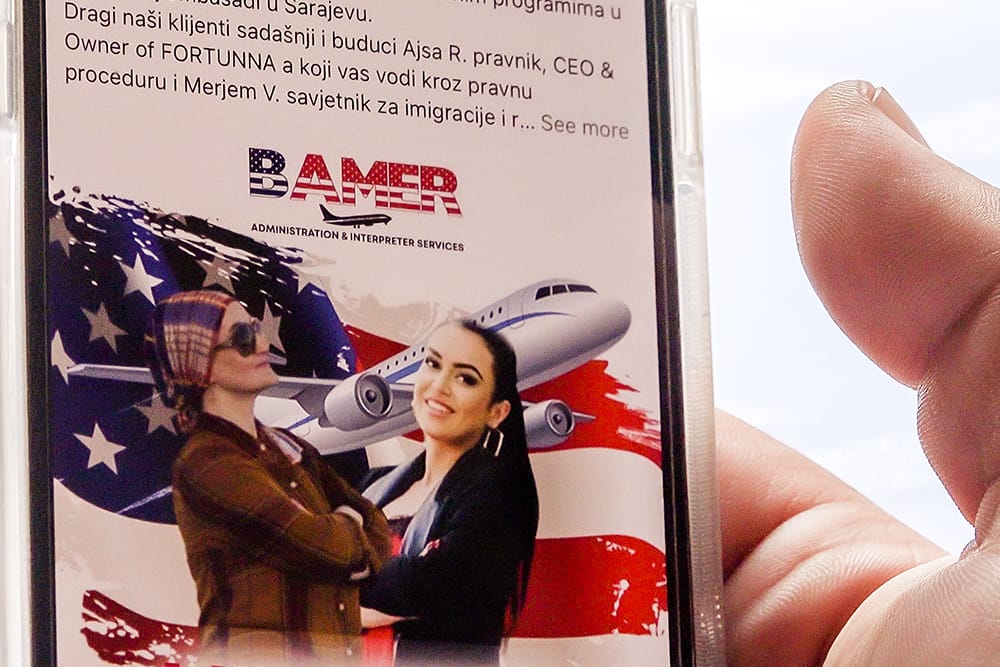
Twenty-nine-year-old Ramić described herself in promotional posts as a fighter for the rights of minorities, and the media presented her as one of the most educated Roma women in Europe. After completing her master’s degree, she worked in several organizations, and two years ago she became “her own boss”. She founded „Forrtuna Administrative Bureau“ which she renamed „Invictus administration“ this year in Visoko. These two organizations appeared in various combinations as contracting parties in the new US visa business.
Veladžić was supposed to find clients and collect money, while Ramić was supposed to sign documents and communicate with the Embassy, claiming that she had a cooperation agreement with them.
Self-confident and with prepared answers to every question, they advertised themselves daily on social networks. They’ve been offering a simple and fast way to an American visa, without waiting and hassle at the Embassy. The clients were only expected to give them money.
Word of a new hope quickly spread among Bosnians and Herzegovinans in America.
“I have been here for 22 years, I have not yet visited my country. I have no family left, only this brother of mine and his family, and I care about them” says Džemal Filan from Jacksonville. Although skeptical, the hope that he could bring his nephew to America and finally have some of his kin close to him was stronger, so he gave Veladžić $3,250.
The same desire was shared by a native Herzegovinian from Detroit, but her sister and her family could not go to America so easily. She recalls the conversation with Veladžić:
“She told me – I have another one (immigrant visa, author’s note), someone seems to have given up. […] I was lucky to have called her and that my sister got into the system! I thought, wow, I’m really lucky!”
While the promotional video was aired, at least ten families in Bosnia and Herzegovina were packing their suitcases, convinced that they were on their way to America thanks to capable agents with good connections, the lucky stars, and payments totaling $52,450.
None of them had any reason to doubt the religiously devoted mother of four from Željezno Polje near Žepče or the lawyer whose office is located right next to the Police Station in Visoko.
A shortcut
Had they searched the website of the US Embassy in BiH on the Internet, they would have seen that they can only apply for a visa in person.
“We do not work with any third party, that is, an intermediary agent,” says consul Martin Thomen who explained that applicants for immigrant visas do not have to pay in advance.
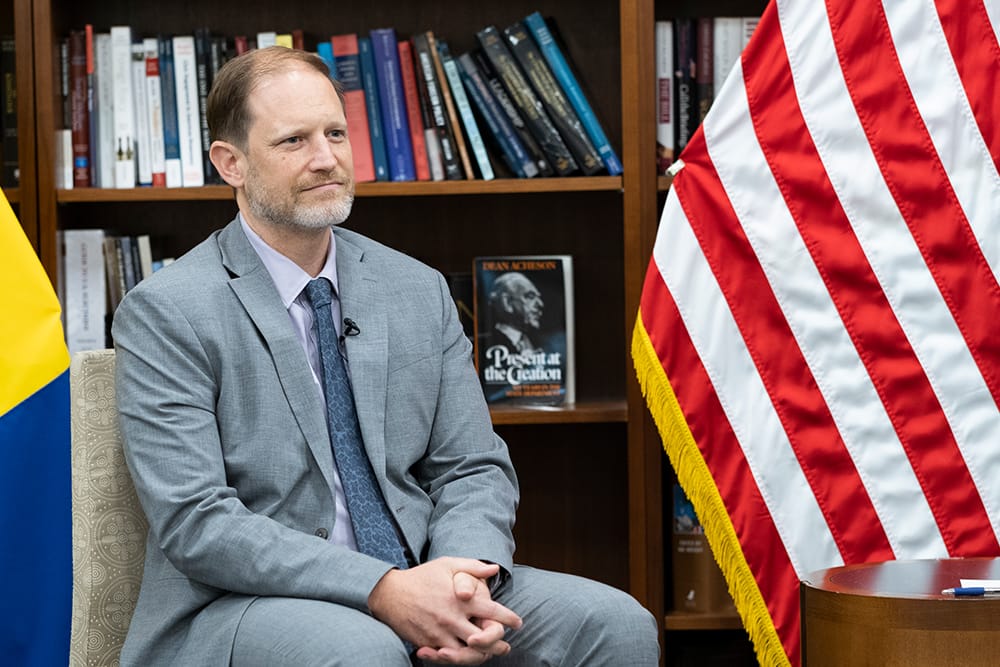
Yet, Veladžić and Ramić convinced their clients otherwise. They offered a program that would bring them to America in twenty days.
“It is much easier and faster. These are unique programs, and you cannot apply for them individually. Simply, you can’t,” claimed Veladžić in the promotional video.
Clients had to pay the first half of the money quickly, sometimes within two hours. The amounts varied. Some families of four were paying $5,800, while others paid $6,250. Individuals paid from the US $ 1,550 to 5,250 for a work visa.
According to Veladžić, the two of them had the right to do so: “It’s not socks, it’s not a fixed price. Simply, you assess the price.“
For CIN interlocutors it was easy to believe what the two women offered through social networks, although now, “after the battle”, everything looks illogical and impossible. They are ashamed and do not want to talk about this experience under their full names.
Money was paid to the agents mostly without any personal contact and business referrals through Western Union, various applications in the USA, through accounts, or in cash.
Although people mostly paid money to Veladžić, she claims she forwarded most of it to Ramić, her husband Edin Garrido Rojas, mother Nermina Ramić, and father Haris Ramić because the daily payment limit set by banks per individual account was the US $2,500. In three months, they collected about US$ 140 thousand.
After the first payment, the clients were signing a cooperation agreement with Ramić, who presented herself as a lawyer, although she was not one.
“Ajša draws up a contract, signs it, then Ajša sends it to me, and from me, it goes to the client, signed by Ajša, then the client returns the signed copy to me and I return the signed copy to Ajša”, Veladžić explains the way of working.
Forgeries
Soon after signing the contract, Ramić would tell her clients that she was filling out visa applications, and then, a few days after the payment, she would inform them that the visas were approved and that they were expected at the Embassy for an interview.
But, Consul Martin Thomen says that the Embassy does not issue any documents during the visa application process: “A document of that type, I guarantee you, is a forgery.”
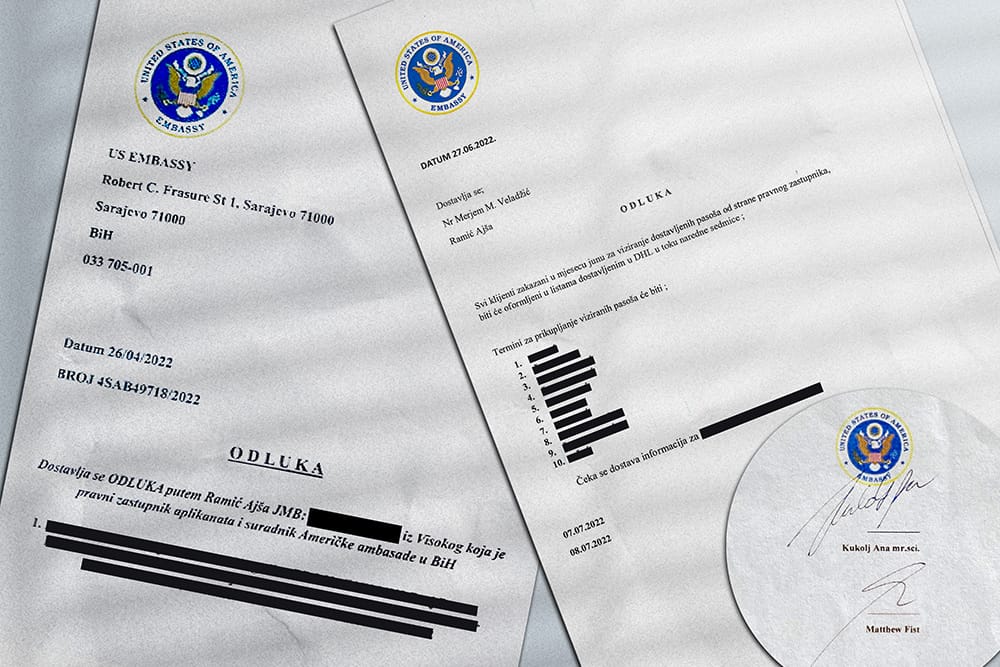
The family from Mostar became suspicious as soon as they received this paper. Namely, in the header of the document was the pale, fake coat of arms of the US Embassy and the phone number of Hotel Bristol in Sarajevo was indicated as the contact number of the Embassy.
“They (Veladžić and Ramić, author’s note) said it was a mistake. How could the US Embassy make a mistake?”, they recall the explanation they received when they confronted their agents.
Most of the people interviewed by CIN journalists received this document only as a photo “taken by someone from the Embassy and passed to Ajša”, while only a few received it directly from her. Among them was Sarajevan Damir Ustamujić, who at the time thought that the savings he had spent to send his son to America could not have been used in a better way. “Fantastic copy. After all, it’s the first time I’ve seen such a paper.”
As soon as they received this document, the applicants were asked to pay the second part of the agreed amount. „The payment was requested so quickly, it’s unbelievable! One day we were discussing it, and two days later we were asked to bring the money“, explains Ustamujić.
Finally, all ten families waited for the middle of June, convinced that they had an appointment to get their visas at the Embassy, but it did not happen. Instead, Ramić took their passports to take them to the Embassy herself.
“You see through it, but you keep going”, the woman from Mostar explains the blind hope that led them to turn a blind eye to obvious shortcomings and illogical things during the cooperation with Veladžić and Ramić.
Disclosure
While promised to receive their passports in a few days, people waited for about a month. During that time, Veladžić and Ramić were answering the persistent and increasingly frequent nervous calls and inquiries from clients about personal documents by asking them to be patient, claiming that the delivery date was postponed due to a “rush at the embassy”.
“Everyone gets suspicious – the passport will arrive, you need to go to DHL to pick up the passports, then you don’t need to go to DHL, the passport will come to the address today, then not today but tomorrow, the day after tomorrow, in two days, etc….” Ustamujić recalls the communication with Veladžić and Ramić.
They warned clients not to contact the Embassy because they would thus “make the process more difficult for both themselves and them”, and they sent them photos of alleged e-mail correspondence with people who signed on forged documents and whom everyone believed to be employees of the Embassy.
None of those emails came from the Embassy’s official address but from commercial Internet services, such as Gmail and Outlook, which is unusual and not allowed in business communication.
At the same time, Veladžić was telling families to start buying plane tickets.
“The visas will be in your passports during next week, God willing. So you can start buying your tickets. If we forget, please remind us of the 30% discount voucher on plane tickets when you come here. It is a token of appreciation for your patience and cooperation. It was not easy, but turbulence during this “flight” is inevitable, she wrote to the family from Mostar.
By then, it was already clear to most that something was wrong, but it was not easy to react, said the father of a family of four from Bosnia and Herzegovina. They sold their property, quit their jobs, and children said goodbye to their friends at school.
“You can’t take some radical step because you’ve already created a problem, you know”, he explains, “You expect that things will get fixed.”
To at least explain to himself what was happening, he called his friends and found out that the signatories of documents do not work at the Embassy at all.
He called Veladžić, who immediately set off from America. Four days after her arrival in BiH, in July of this year, she met Ramić in person for the first time in Visoko.
On the same day, the applicants’ passports which were believed to have been at the Embassy, were sent from the post office in this city in a plain envelope. The indicated sender was Ana Kukolj from Sarajevo, whom Ramić presented as an employee of the Embassy and the signatory of the visa decisions.
In the next few days, Veladžić met with clients to confirm to them that their visas and interviews are all set, although several of them already knew that their applications had not been submitted at all. That was the answer they received from the official e-mail address of the Embassy.
Veladžić went to the Embassy with the clients.
“Only then did I see with my own eyes when the officer told me “this is not the logo of the Embassy.” You are not on the list,” claims Veladžić, adding that she immediately asked Ramić who were the people she claimed were the Embassy officials with whom she cooperated.
Among them was Amela Dinar Mostić.
“I explained everything to you very clearly. Amela is part of the team and she is Ana’s (Kukolj, author’s note) boss. There’s no need to interrogate me and talk to me like this over the phone, I guess, you and I are a team in all of this,” said Ramić and threatened to call the police.
The only Amela Dinar Mostić in Visoko is a doctor in the local health center. She claims she does not know her fellow citizen Ramić and has nothing to do with the US Embassy in Bosnia and Herzegovina.
In addition to Ana Kukolj, the forged documents were also signed by Matthew Fist. CIN journalists did not find people with these names who would be connected to the Embassy, Ramić, or Veladžić.
“I communicated with everyone via e-mail, but I never talked to any of them via phone,” says Veladžić.
Reports in BiH and USA
Upon learning of these events, the US Embassy in Sarajevo informed the BiH public, its office in Washington D.C., and the local police about the fraud.
Veladžić filed a fraud report against Ajša Ramić to the FBiH Police Administration in Zenica and returned to America. She claims that she got all the documents and information she gave people from her.
“I didn’t know it was illegal (…) A lawyer should do his/her work. Why would I worry about it?”.
She sent a notice to all clients and her business partner about the termination of cooperation with Ramić, asking Ramić to return the clients their money. Since then, Ramić has not answered their phone calls nor did she want to speak officially with CIN journalists.
At the request of the prosecutor of the Zenica-Doboj Canton, she was heard in mid-August regarding Veladžić’s fraud report.
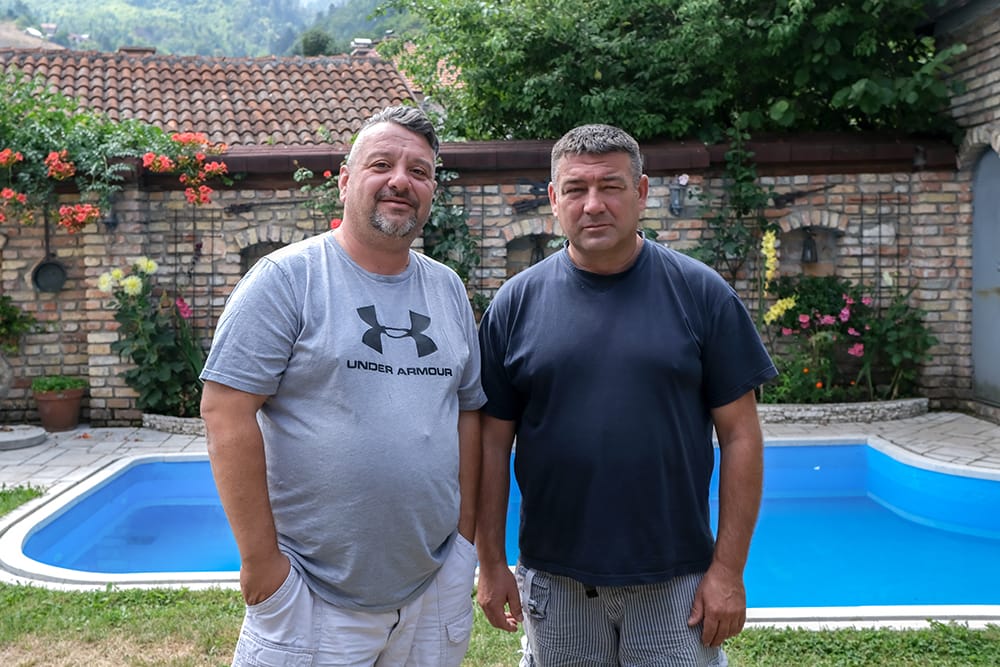
36 families and individuals paid almost US$ 140 thousand to the business partners. According to Merjem Veladžić, she received US$ 48.5 thousand, and Ramić US$ 91.5 thousand.
This sum includes the $5,250 that Edin Salešević from Sant Luis paid for his relative’s visa: “I told Merjem, take out a loan, return the money to whomever you can. Pay! You made your bed, now lie in it. I’m sorry for her, we have known each other. I am sorry, but when I make a mess, I too pay the price.”
Salešević came to BiH for two young people, planning to give them a job and a chance to live the American dream, but he returned to his new homeland alone, with a lesson learned in his old homeland.
“Bosnia is always the good place for scams.”




